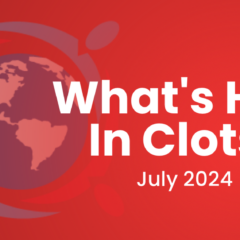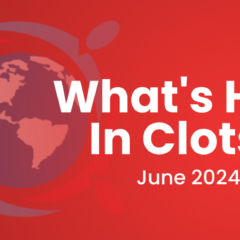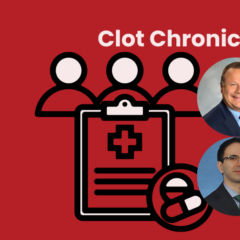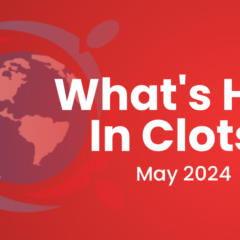Last updated on
What’s Hot in Clots – September 2023
Key Updates in Thrombosis
Table of Contents
- Treating atrial high-rate episodes (AHREs) with anticoagulation? Not everything that makes theoretical sense is beneficial
- Cancer-associated distal DVT: For how long should we treat them?
- New ESC guidelines for acute coronary syndromes
- Repeating myself: “Not everything that makes theoretical sense is beneficial”: The case of FRAIL AF
What a month! ESC 2023 in Amsterdam was full of impactful studies for cardiovascular diseases. Many were related to interventional cardiology or heart failure, but here are my top picks for the world of thrombosis:
Treating atrial high-rate episodes (AHREs) with anticoagulation? Not everything that makes theoretical sense is beneficial
AHREs are a group of arrhythmias identified through implantable cardiac devices (namely pacemakers and defibrillators). One would think that many AHREs may represent atrial fibrillation (AF). However, in a multicenter randomized trial, the authors failed to show a significant reduction in stroke or systemic embolism in patients who were randomized to edoxaban vs placebo with AHREs and a high CHA2DS2-VASC score but no AF per surface ECG. Edoxaban, however, was associated with significant increase in major bleeding. Additional trial results with other agents are forthcoming. Read more
Cancer-associated distal DVT: For how long should we treat them?
Speaking of edoxaban, it was not all disappointing news at ESC 2023 – the drug had a winning trial in the DVT space! Previously, I had covered in this blog that cancer-associated distal DVT was, indeed, associated with a high risk of recurrent venous thromboembolism (VTE), as high as those with proximal DVT. Now, the ONCO-DVT investigators randomized patients with cancer-associated distal DVT to 3-month vs 12-month anticoagulation with edoxaban. Although, numerically, there were more bleeding events with longer duration of treatment, and some treatment interruption in the 12-month group, longer duration of treatment led to a whopping >80% relative risk reduction for the primary outcome of recurrent VTE or VTE-related death! Read more.
New ESC guidelines for acute coronary syndromes
The new ESC guidelines for management of patients with acute coronary syndromes were released during the 2023 meeting. There are many new recommendations and great graphics in the guidelines. There were two things that particularly caught my attention: first, unstable angina has stayed in the guidelines. A few years ago with the introduction of more sensitive troponin assays, some experts, including the legendary cardiologist Dr. Braunwald, expected that unstable angina may go away. Although we have fewer patients in practice coined with the term, some are still being encountered and the guidelines have kept them as their own entity. Second, the ESC 2023 guidelines suggested aspirin as the preferred option (class I) over P2Y12 inhibitors (IIa) for long-term antiplatelet monotherapy plan. This is at odds with some recent studies and has led to active discussion among clinicians and investigators. Read more.
Repeating myself: “Not everything that makes theoretical sense is beneficial”: The case of FRAIL AF
Many found the results of the FRAIL AF trial surprising. This strategy trial randomized frail older adults with AF to continuation of their vitamin-K antagonists vs switching to direct oral anticoagulants (DOACs) without pre-specifying which DOAC agent. In short, the trial failed to show any benefit from switching to DOACs, and in fact, the switch was associated with an excess in major bleeding events. Some hypotheses are being discussed about the reason behind these findings, including a prior good experience with vitamin-K antagonists in these patients, side benefits of INR monitoring in these patients (more contact with healthcare system, to check for modifiable bleeding risk factors), and others. Practically, do not switch your stable patients from vitamin-K antagonists to DOACs! Read more.
For more updates, be sure to subscribe to get the latest updates each month.
Find this information helpful? Please consider making a small donation in support of thrombosis education & resources.

Behnood Bikdeli, MD, MS
Cardiologist, Section of Vascular Medicine, Division of Cardiovascular Medicine, Brigham and Women’s Hospital
Investigator, Thrombosis Research Group, Division of Cardiovascular Medicine, Brigham and Women’s Hospital
Instructor, Harvard Medical School
Investigator, Yale/ YNHH Center for Outcomes Research and Evaluation, Yale School of Medicine
Investigator, Cardiovascular Research Foundation



